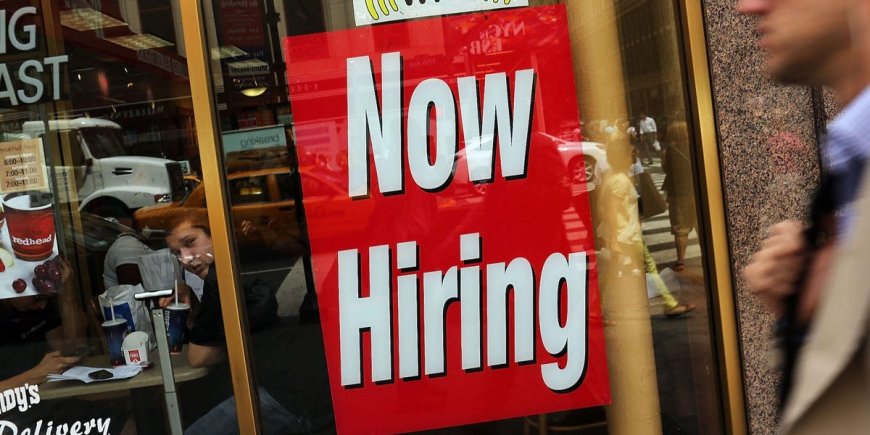Is the vibecession about to end?
Improving small-business optimism after Trump's victory could open up a floundering labor market.

Spencer Platt/Getty Images
- Small-business optimism may rise after Trump's election win, potentially boosting hiring intentions.
- Optimism surged post-2016 election, with small businesses planning to hire more employees.
- Improved labor market conditions could enhance consumer sentiment and boost wages.
Welcome to the vibe-spansion.
Yes, that's a portmanteau of vibes and expansion, and it's the upbeat version of its better-known cousin, the vibecession.
The term vibecession, a play on the word recession coined by content creator Kyla Scanlon, has been used to describe how people have felt about the economy for the last few years. While the National Bureau of Economic Research hasn't declared an official recession during that time, as there's been no significant decline in employment and consumer spending, inflation and a floundering job market have left consumers feeling downcast about the economy.
That could be about to shift.
That's because the optimism of small-business owners, and their intentions to hire more employees, are probably set to rise after Donald Trump's win in the presidential election earlier this month, with the president-elect promising to cut taxes and regulations.
"Small business owners lean Republican," said Oliver Allen, a senior US economist at Pantheon Macroeconomics, in a November 12 note.
Numbers from the National Federation of Independent Businesses' November survey aren't in yet, but the 2016 election period saw a substantial shift in small-business optimism. Even with higher interest rates and a slightly slowing economy, one would expect some sort of positive jolt to outlooks, experts say. Goldman Sachs
"After Donald Trump was elected the 45th President in November 2016, the National Federation of Independent Businesses (NFIB) small business optimism index skyrocketed. It was truly a reflection of 'animal spirits' coming to life and this behavior is likely to be repeated," Goldman Sachs' Chief US Equity Strategist David Kostin wrote in a November 18 client note. "We expect an improving small business operating environment will boost the sentiment and spending of SMBs in 2025 and lift the earnings and valuation of stocks with revenues tied to that spending."
Admir Kolaj, an economist at TD Economics, agrees.
"Although the economy is on different footing now and facing a different set of challenges, we anticipate we're likely to see an improved mood among small business owners to cap off the year," he said in a November 12 note.
NFIB data shows that optimism bleeds through to concrete actions. Hiring intentions also jumped after the 2016 election, and they have tracked closely with actual job openings. NFIB
Of course, job openings had already been on the rise in the years leading up to 2016, while they are falling today. But the expected jump in optimism, and the presumptive knock-on effect in hiring intentions, could turn that around.
With inflation having cooled off and interest rates starting to fall, more job opportunities flooding the market could be what consumers need to feel better about the economy.
When there are more jobs available, the labor market becomes more employee-friendly, and workers are able to command higher wages. Higher pay could help consumers feel like they're finally able to get ahead, assuming it doesn't fuel higher inflation again with many of the pandemic supply chain hurdles now out of the way.
Workers will also feel less trapped in their current jobs when openings are more abundant, according to Daniel Zhao, lead economist at Glassdoor. About two-thirds of workers feel "stuck," he said. With openings falling since 2022, the number of quits has dropped dramatically. St. Louis Fed
"Once the job market heats up again, that will open a relief valve to release the bottled up pressure, by giving workers the option to quit in favor of better options on the market," Zhao wrote in a November 19 report. "For the time being, employers may be benefiting from unusually low turnover rates, but they shouldn't be complacent—a wave of revenge quitting is on the horizon."
The turnaround may not be easy. Unemployment has been trending upward, and the tough credit environment for small businesses may mean that continues. Uncertainty stemming from Trump's tariff proposals could also hamper hiring and business investment.
But the idea that a rosier outlook from small-business owners could boost labor conditions is plausible. The past data is there to support it. Whether the post-election bump in optimism will be enough to spark a hiring spree and improve consumers' attitudes this time around will become evident in the months ahead.
The vibe-spansion could be upon us.
What's Your Reaction?






































